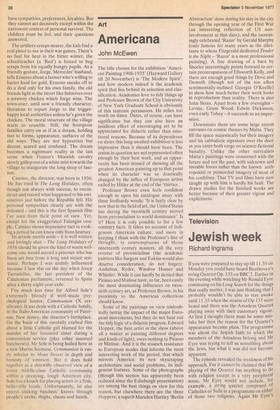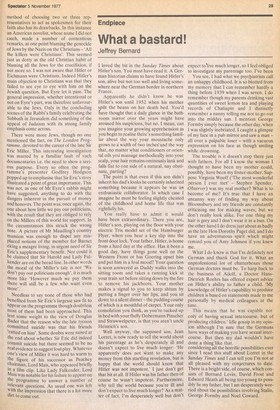television
Jewish week
Richard ingrams
If you were prepared to stay up till 11.35 on Monday you could have heard Beethoven's string Quartet Op. 135 on BBC 2. Earlier in the evening while watching Mr Ronald Eyre continuing on his Long Search for the things that really matter, I was just thinking that I probably wouldn't be able to stay awake until 11.35 when the strains of Op 135 were heard and there was the Amadeus Quartet playing away with their customary vigour. At first J thought there must be some mistake but then the reason for the Quartet's appearance became plain. The programme was about the Jewish faith to which the members of the Amadeus belong and Mr Eyre was trying to tell us something about the Jews, but What it was did not become apparent. The episode revealed the weakness of his approach. For it cannot. be claimed that the playing of the Quartet has anything to do with religion except in a very peripheral sense. Mr Eyre would not include, for example, a string quartet composed of Catholics or Sufis in a programme on either of those two religions. Again Mr Eyre 's method of choosing two or three representatives to act as spokesmen for their faith also has its drawbacks. In this instance an American novelist, whose name I did not catch, made a number of contentious remarks, at one point blaming the genocide of Jews by the Nazis on the Christians — 'All the killers were Christians'. This seemed just as dotty as the old Christian habit of blaming all the Jews for the crucifixion, if not more so. I was not aware that Hitler or Eichrnann were Christians. Indeed Hitler's main Objection to Christians was that they failed to see eye to eye with him on the Jewish question. But Eyre let it pass. The general impression, whether intentional or not on Eyre's part, was therefore unfavourable to the Jews. Only in the concluding scenes of the Rabbi's family celebrating the Sabbath in Jerusalem did something of the appeal of Judaism with its strong family emphasis come across.
There were more Jews, though no one mentioned the fact, on The London Programme, devoted to the career of the late Sir Eric Miller. This interesting investigation was marred by a familiar fault of such documentaries i.e. the need to show a serious purpose. Every so often the programme's presenter Godfrey Hodgson popped up to emphasise that Sir Eric's story illustrated a point of great importance. This was not, as one of Mr Eyre's rabbis might have suggested, anything to do with the dangers inherent in the pursuit of money and honours. The point was, once again, the One about how little we pay our politicians, With the result that they are obliged to rely on the Millers of this world for support. In the circumstances this struck the wrong note. A picture of Mr Maudling's cOuntry mansion was enough to dispel any misplaced notions of the member for Barnet eking a meagre living, in urgent need of Sir Eric's supplementary benefit. Nor could it be claimed that Sir Harold and Lady Falkender are on the bread line. In other words the moral of the Miller's tale is not 'We don't pay our politicians enough', it is much more like 'However much we pay them there will still be a few who want even more'.
Needless to say none of those who had benefited from Sir Erie's largesse saw fit to appear on the programme though doubtless most of them had been approached. This Lent sonic weight to the view of Douglas Bader that the reason why the late tycoon Committed suicide was that his friends 'ratted on him'. Some doubts were raised at the end about whether Sir Eric did indeed Commit suicide but there seemed to be no real evidence to suggest foul play. Whatever one's view of Miller it was hard to warm to the figure of his successor as Peachey chairman, Lord Mais, who appeared briefly in a film clip. Like Lady Falkender, Lord Mais was notable for his failure to appear on the programme to answer a number of relevant questions. As usual one was left With the impression that there is a lot more dirt to come out.



































 Previous page
Previous page